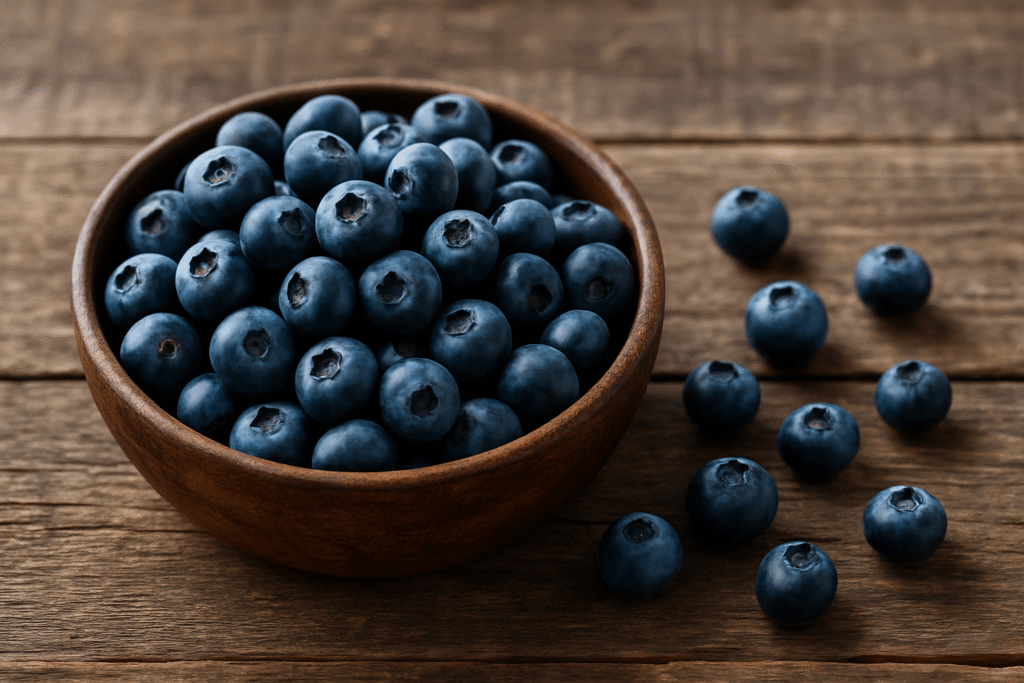Introduction
Blueberries are more than just a sweet addition to your morning smoothie or pancake stack. These tiny, vibrant berries are often called a superfood — and for good reason. Backed by scientific research, blueberries are loaded with antioxidants, vitamins, and phytonutrients that support heart health, brain function, and overall well-being.
In this blog, we’ll explore everything you need to know about blueberries: their nutritional value, proven health benefits, varieties, usage tips, and FAQs — all backed by research.
What Makes Blueberries Special?
Blueberries belong to the Vaccinium genus and are native to North America, though they’re now grown worldwide. Their deep blue color comes from anthocyanins, natural pigments with strong antioxidant properties. These compounds not only make blueberries attractive but also play a major role in protecting cells from oxidative stress.
Unlike many fruits, blueberries are low in calories but dense in nutrients, making them an ideal everyday choice for a balanced diet.
Learn more about anthocyanins from National Library of Medicine.
Nutritional Value: A Cup Full of Goodness
A single cup of fresh blueberries (~148 g) contains:
- Calories: ~80
- Fiber: 3–4 g
- Vitamin C: 24% of daily needs
- Vitamin K: 36% of daily needs
- Manganese: 25% of daily needs
- Other nutrients: potassium, B vitamins in small amounts
(Source: USDA FoodData Central)
This profile explains why blueberries are considered a nutrient powerhouse — naturally low in fat and sodium, yet packed with essential vitamins and minerals.
Research-Backed Health Benefits of Blueberries
1. Rich in Antioxidants & Anti-Inflammatory Compounds
Anthocyanins in blueberries help neutralize free radicals, reducing oxidative stress and inflammation.
- Research shows that regular blueberry consumption may lower chronic disease risks.
2. Supporting Heart Health
Blueberries improve vascular function, cholesterol balance, and blood pressure.
- A 2023 clinical trial published in the American Journal of Clinical Nutrition confirmed that wild blueberry polyphenols improve heart-related biomarkers.
3. Boosting Brain & Cognitive Function
Blueberries are linked to better memory and concentration, especially in older adults.
- Studies suggest they may slow age-related cognitive decline.
4. Supporting Metabolism & Diabetes Management
Blueberries enhance insulin sensitivity and help regulate blood sugar levels.
- A systematic review in Nutrients Journal highlights their role in metabolic health.
Types of Blueberries You Might Find
- Highbush (Vaccinium corymbosum): Common supermarket variety.
- Lowbush / Wild (Vaccinium angustifolium): Smaller, often richer in antioxidants.
- Rabbiteye (Vaccinium ashei): Thrive in warmer climates, popular in the U.S. South.
Each type differs in flavor and nutrient density, but all are rich in health-promoting compounds.
How to Select, Store & Use Blueberries
- Selection: Look for berries that are firm, deep blue, and have a silvery “bloom.”
- Storage: Keep refrigerated for up to a week, or freeze for long-term use. Frozen blueberries retain most nutrients.
- Usage: Add to smoothies, yogurt, salads, oatmeal, or desserts.
Delicious Ways to Enjoy Blueberries
- Morning Power Bowl: Greek yogurt + oats + nuts + fresh blueberries.
- Refreshing Salad: Spinach, goat cheese, walnuts, and blueberries with olive oil.
- Healthy Dessert: Blend frozen blueberries with banana for a creamy, sugar-free ice cream.
Who Should Be Cautious?
Blueberries are safe for most people. However:
- Those with berry allergies should avoid them.
- People on blood thinners (warfarin) should monitor intake due to vitamin K content.
Future of Blueberry Research
Current studies confirm cardiovascular and cognitive benefits, but scientists continue to explore:
- The ideal daily serving size.
- Long-term effects on chronic disease prevention.
- Whether whole berries outperform supplements in delivering benefits.
FAQs About Blueberries
1. Are blueberries good for weight loss?
Yes. Low-calorie, high-fiber, and naturally sweet — perfect for weight management.
2. What is the best time to eat blueberries?
Anytime. Morning boosts energy, while evening satisfies cravings healthily.
3. Are fresh or frozen blueberries better?
Both are healthy. Frozen berries are flash-frozen at peak ripeness, retaining nutrients.
4. How many blueberries should I eat daily?
About ½ to 1 cup per day provides measurable benefits.
5. Do blueberries help skin health?
Yes. Their vitamin C and antioxidants boost collagen production and reduce aging effects.
Final Thoughts
Blueberries are one of nature’s simplest and most powerful superfoods. Backed by research, they support your heart, brain, skin, and metabolism while being versatile and delicious.
Pro tip: Aim for at least ½ cup daily — fresh, frozen, or blended — to unlock their full health potential.
We’d Love to Hear From You!
Blueberries are more than just a fruit — they’re little bursts of health and happiness. If this blog inspired you to add them to your diet, or if you already enjoy them in your own unique way, share your thoughts below! Your feedback not only encourages us but also helps other readers discover new ideas.
Drop a comment with your favorite blueberry recipe or experience. Let’s make this a community of health-conscious food lovers!
Read our blog on Coconut Water –https://newsarmour.com/coconut-water-benefits/





